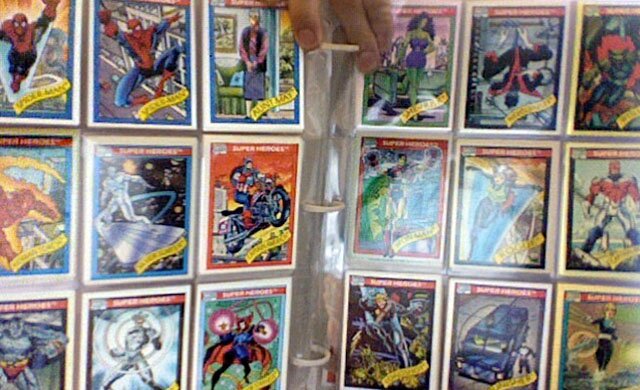For those of us who grew up on comic books who your favorite character was as a child may say a lot about you. Do you prefer a loner or a team player? A pillar of virtue or a tragic anti-hero? Do you like a psychological thriller, or a good old fashioned beat down? Do you prefer magic or science? Even loyalties to DC or Marvel can become as polarizing as Republican or Democrat, and as in real life, the independents are the most interesting. Comic books can teach us a lot about heroism, and creed… but recently I’ve been thinking they taught me a lot about economics too.
My introduction to comic books was through the first series of Marvel Universe trading cards. I was the new kid in school and during recess and lunch a picnic table in the back of the field transformed into a bustling open air market the likes of which I’ve only ever seen in third world countries and the Wall Street scenes of Trading Places. There were two commodities in this market, Marvel trading cards and drawings of comic characters.
There were rules in this market. Contrary to the prevailing wisdom, condition wasn’t terribly important. Hero and villain cards were generally valued by the stats on back, enhanced by how awesome the art was. But the goal of trading was to complete sets. A team photo with all it’s member. A famous battle card with all the participants. Getting all three Spider Man costumes was especially valuable because the Cosmic Spider Man card was rare for some reason. But I found my first hero when I discovered Wolverine.
There was just one problem. I didn’t have any money. I didn’t even really know where the cards came from. I learned years later that kids bought them from the hot dog stand at weekend little league games, but I never attended a game. So I focused on the second commodity people traded in the market, drawings. I convinced a few friends lend me some cards during class and I traced them. Then I traced the tracing over and over until I could draw them from memory. Iron Man and Dr. Strange were the first. If a drawing was good enough people would trade cards for it, but the market would not tolerate too many of the same drawing, so I had to trade for new cards I wanted to learn to draw.
Trades could be incredibly complex, involving three or more parties. A trade to get Captain America with one kid could be contingent on a trade to get Red Skull with another kid. Some kids would only trade cards they had doubles of. Other kids would want to trade whole teams at once to avoid breaking up the set. I focused on trades where I could grow my total quantity of cards, happy to trade a Hulk I already learned to draw for two or three lesser known sidekicks.
I collected the entire set this way without spending a single Federal Reserve Note. Except the holograms, which I eventually bought later. I also learned to draw this way. As an investment this was never as profitable as we all imagined it would be. Most of the cards were irreparably damaged from being carried around in a pocket wrapped in a rubber band. But I did learn firsthand a whole host of economic concepts that would make libertarianism and voluntaryism that much easier to understand years later.
I recognized the concept of subjective value pretty early. Each card held different value to different kids, depending on the rest of their collection. I learned about the creation of wealth through labor. Drawing was time consuming, and sometimes difficult, but it could replace money. I learned about scarcity, supply and demand, but most importantly I learned the importance and power of win/win negotiations. It didn’t take long to realize that the key to successful trade was not only to look through the other kid’s collection for the cards you wanted, but to look through your collection for the cards that would be more valuable to him then they are to you, and to look for swaps that were mutually beneficial to both of you.
And don’t forget to visit our official website to learn more about the Silver Circle Movie:http://SilverCircleMovie.com
About the Author: Davi Barker
In grade school Davi refused to recite the pledge of allegiance because he didn't understand what it meant. He was ordered to do as he was told. In college he spent hours scouring through the congressional record trying to understand this strange machine. That's where he discovered Dr. Ron Paul. In 2007 he joined the End The Fed movement and found a political home with the libertarians. The Declaration of Independence claims that the government derives its power “from the consent of the governed." He does not consent.


